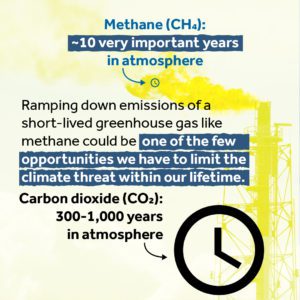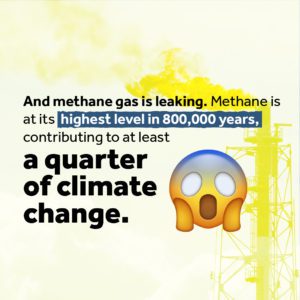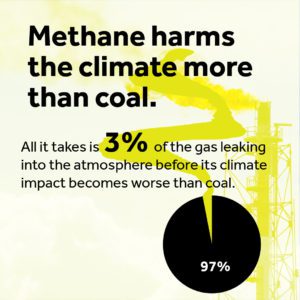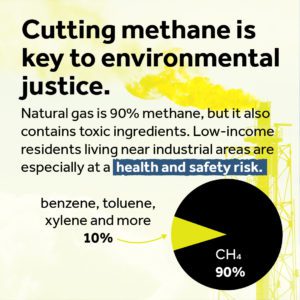By now you surely know that carbon dioxide has long been Climate Change Public Enemy #1 — that pesky greenhouse gas created by burning fossil fuels, trapping heat in our atmosphere and contributing massively to climate change — but what about methane?
Methane is a greenhouse gas similar to carbon dioxide, but a few key differences make it significantly more impactful to the climate crisis. It’s alarming — yet tackling our methane problem (i.e., natural gas) will offer even bigger, more immediate relief to our warming planet than just cutting carbon dioxide alone.

Methane levels have ballooned because of oil and natural gas industry expansion, as well as industrial livestock farming (a fact that’s sure to kill at parties: it’s actually cow burps, not farts, that emit methane). Here’s the main takeaway: While methane only lasts for about a decade in the atmosphere (carbon dioxide can hang around for anywhere from 300 to 1,000 years), it’s 80 times more powerful than CO2. This means methane is less of a concern when it comes to long-term climate trends, but it makes a HUGE climate impact while it’s here.
And pretty much all the people who want to make sure we have a livable future are talking about this right now. The IPCC report released this week said for the first time ever that it is essential to make “strong, rapid and sustained reductions” in methane emissions to limit global temperature rise. Which is no surprise given that methane is at its highest level in 800,000 years, contributing to at least a quarter of climate change.
Methane reductions are suddenly a very hot topic because the report also laid out the likely scenario of surpassing 1.5 degrees Celsius of atmospheric warming in the next 20 – 30 years (a prediction bumped nearly a decade earlier than their previous 2018 report). Ramping down emissions of a short-lived greenhouse gas like methane could be one of the few opportunities we have to mitigate the climate threat at the decades timescale, in addition to the centuries-long timescale of CO2.
Cutting methane emissions is the single fastest, most effective way there is to slow the rate of global warming right now,” Ilissa Ocko, senior climate scientist with the Environmental Defense Fund, said at a Monday press conference.
We need to act fast
Twenty-five percent of global methane emissions come from fossil fuel industries, mainly oil and gas wells, as well as gas pipelines and coal. The International Energy Agency estimates that the global oil and gas sector emitted about 70 million tons of methane in 2020 — and those emissions need to drop by more than 70 percent by 2030 to meet the IEA’s sustainable development scenario.
But instead of bringing methane emissions down, gas industries like fracking have exploded in the last decade, positioning fracked gas — the fossil fuel commonly referred to as natural gas — as a well-disguised “bridge fuel” between fossil fuels and renewables. Fracked gas, which is nearly 90 percent methane, might only emit half the CO2 of coal when burned, but all it takes is 3 percent of that gas leaking into the atmosphere before its emissions become worse than coal. And we already know that’s happening. In the Permian basin (in Texas and New Mexico), satellite analysis shows active oil and gas wells are leaking at a rate of 3.7 percent. Another recent study found that annual methane emissions from abandoned oil and gas wells in the U.S. are the 11th largest source of anthropogenic methane emissions in the country. Which is to say, gas is not a natural or clean alternative, and we need to shift away from gas now if we want any chance of limiting atmospheric warming.
Be wary of gas industry-funded PR groups pitching “renewable natural gas” in the months ahead, rolling out the same re-branding playbook as “clean coal” or low-tar cigarette campaigns of years past. It’s already happening here in the Northwest.
Fracked gas poses health risks to already-vulnerable communities
Cutting methane emissions is critical to environmental justice. Natural gas is 90 percent methane, but it also contains carcinogens and harmful gases like benzene, toluene, and xylene. Low-income residents living near industrial areas are especially at a health and safety risk.
This all seems like pretty bad news, but we still have a small window of time. While we are likely to hit 1.5 degrees Celsius of warming by the 2040s, we have the power to determine how much better (or worse) it can get from there. In Washington, we have some of the cleanest electricity in the country and it’s getting cleaner because of the Clean Energy Transformation Act (CETA), which commits Washington to an electricity supply free of greenhouse gas emissions by 2045. We’re also working toward a vision — locally and statewide — of transitioning off fossil fuels for indoor heating over the next several years by setting standards for new construction, making investments in electrification, and securing funding and incentives to ensure justice in the transition for energy users and for workers. This is our window for opportunity. It’s time to take action.
Live in Bellingham? Sign our petition to transition the city away from methane use.




